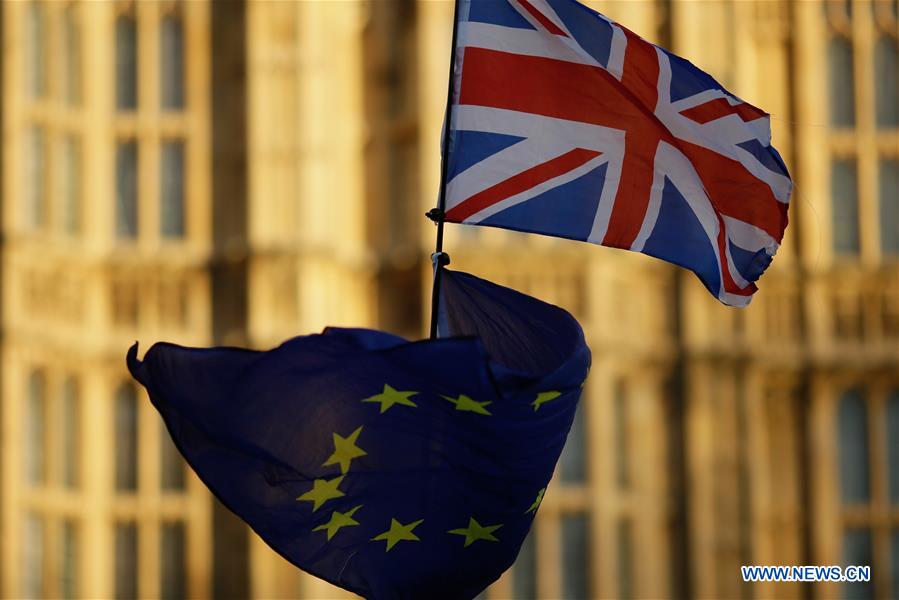May's Brexit deal defeated: What's next?
- By Heiko Khoo
 0 Comment(s)
0 Comment(s) Print
Print E-mail China.org.cn, January 21, 2019
E-mail China.org.cn, January 21, 2019

Theresa May suffered a catastrophic defeat in parliament on Jan. 15, when 432 MPs voted against her Brexit deal and only 202 voted for it. The next day the conservative government survived a no-confidence vote that was moved by opposition leader Jeremy Corbyn and backed by all the opposition parties. The conservative MPs, with 10 votes from the Democratic Unionist Party (DUP), managed to ensure the government's survival, with a final vote of 325 backing the move and 306 opposing it.
Inside the Conservative Party, Jacob Rees Mogg MP leads the right-wing European Research Group (ERG), which favors leaving the EU with no deal. In December he attempted to oust Theresa May as party leader but failed. This week the ERG joined hands with MPs of all stripes in order to vote down Theresa May's deal, which was the result of two years of negotiations and which had agreement from the governments of the EU's 27 member states. Thus, this defeat is the biggest of any government in British parliamentary history.
As a result of the sound thrashing of her deal, the suspension of Brexit is likely, as it is set to automatically occur at 11 p.m. on March 29 in the absence of a deal. With no deal in place, this will cause considerable disruption to trade and legal arrangements. Both within parliament and outside, this scenario is generally predicted to be catastrophic.
During the parliamentary debate on the Labour Party's no-confidence motion, it became clear that the conservatives refuse a general election because they fear a serious electoral meltdown. And, above all, they fear that Jeremy Corbyn could become prime minister.
After winning the confidence vote, the prime minister offered an olive branch to the opposition parties, as without them she will be unable to find a way out of the impasse. Corbyn, however, made his participation contingent on a guarantee that May will take a "no-deal Brexit" off the table. She has refused to make this guarantee, and some cabinet ministers are even considering restarting negotiations with the EU based on a no-deal scenario. Nevertheless, the overwhelming majority of MPs are implacably opposed to a no-deal Brexit.

The government now has to return to parliament with an adjusted deal on Monday, Jan. 21. Amendments to this deal involved possible cross-party coalitions seeking to cobble together something that parliament can agree on, and thereby forge a new deal that can be taken back to Brussels. This is unlikely to succeed, as the Conservative Party's internal divisions lie at the very heart of the problem.
Meanwhile, EU leaders are clearly irritated at Britain's parliamentary process and are infuriated that the negotiations to date have produced no tangible results. The EU's attitude towards an extension of the Brexit deadline has, until now, been envisaged only in the event of a general election or a referendum.
Despite defeating the no-confidence vote, it is not excluded that if the parliamentary impasse continues over the next weeks, Theresa May herself might pivot towards calling a general election.
However, conflicts within the Conservative Party were responsible for the Brexit referendum in the first place. In the 2017 general election, Jeremy Corbyn revealed a remarkable capacity to galvanize popular support for Labour, but the Brexit issue has exacerbated sharp divisions between his own party (which is overwhelmingly pro-EU) and its voting base, which in many areas is pro-Brexit. Corbyn has tried to balance these conflicting pressures by emphasizing the need for unity of the working class, a message that has proven hard to sell.
So for the time being, it looks as though the chaos of Brexit will continue to play out on the stage of the British government.
Heiko Khoo is a columnist with China.org.cn.
For more information please visit: http://china.org.cn/opinion/heikokhoo.htm
Opinion articles reflect the views of their authors, not necessarily those of China.org.cn.





